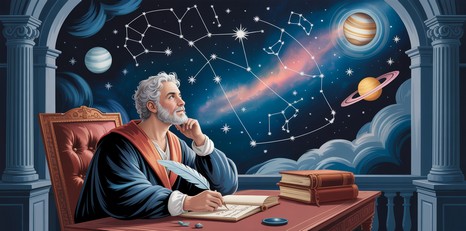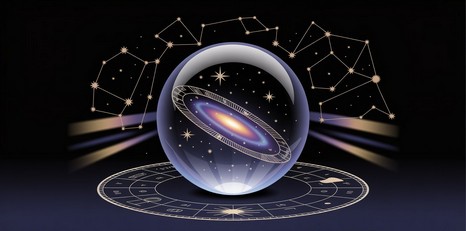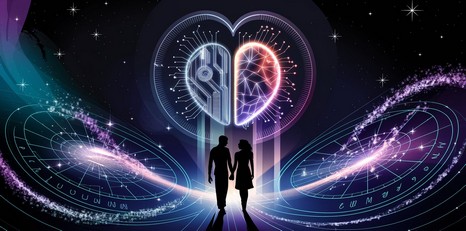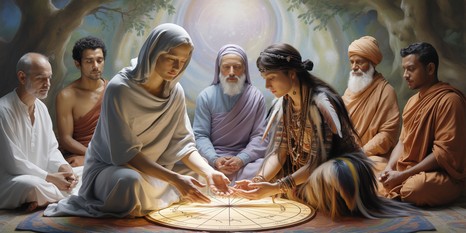Best ways for learning astrology
Several users sent me an email asking what is the best way to learn astrology.
There isn't a best way in general, but there's a best way for each person, according to their astrological chart.
First, we might explore the person's attitude and their intention about learning astrology. There are very different attitudes among astrologers. I see the roots of these attitudes coming from their dominant planet.
For instance, a Mercury dominant would be driven mainly by curiosity and the love of exploring astrology from an intellectual level, as they get pleasure by revealing the intricacies of the planets, houses, aspects and transits.
A person with a Moon dominant would be interested in the emotional aspects of astrology, as they enjoy finding out how the planets give life to their feelings.
A Venus dominant would be interested in the balance between the astrological elements, in the astrology of relationships and how two persons can best be matched through their natal charts.
A Neptune dominant would be attracted by the mystical side of astrology, a Pluto dominant would feel compelled to penetrate astrology's mysteries and so on.
A couple of users also asked me whether 12andus would create videos explaining astrology or the meaning of the dominant planets. I am not going to do that at least for the medium term. I will explain the reasons why.
What I learned in 35 years of passion and research is that astrology is an amazing tool for self-awareness connecting our psyche to the perennial wisdom of the astrological symbolism. As with anything which improves self-understanding, this is better conveyed by media which are helpful to deepen the inner process and view.
Written words travel back and forth between the book (yes, much it is better to read a book than to do so from the screen) and our awareness. Written words respect our pace, while videos pour information directly inside our minds with less involvement from our side.
Since the images are already created and forced into our consciousness, videos hijack our imaginative capacities. By reading books, we become co-creators but when watching videos, we become just an audience.
I think a word is worth 1,000 images, not the opposite. Words create inner images. I might be biased by my past as a book publisher, but I feel that good old words are still the best medium to convey meaning and insights.
After this preface, let's get to the heart of the question. In my opinion, there are 3 main channels for learning astrology, all needed: books (as a Mercurian, I love books), personal conversations with other astrologers and people who are passionate about astrology and practice, practice practice.
A short list of some of the main astrologers whose books have influenced my formation:
Dane Rudhyar joined astrology with spirituality and transpersonal psychology. Not always easy to read, he was a pioneer in considering astrology as something more related to the inner, rather than to the outer happenings. Dane represents a quantum jump from the astrological tradition to see astrology as something that was going to happen.
Stephen Arroyo is an astrologer who wrote several books with a psychological oriented attitude, and is also a pioneer in combining astrology with self-understanding.
Liz Greene connects astrology with depth psychology. Her books reveal the deep meaning of the archetypes in our psyche. The books about Saturn and Neptune are in my opinion masterpieces.
Robert Hand's writings convey depth through an approachable language. Remarkable are his works on relationship astrology and the astrological interpretations suited for children.
André Barbault with his discerning considerations about world astrology and history has connected the individual charts of the kings with the countries' histories.
Lisa Morpurgo was an Italian astrologer and writer who created innovative theories about the planets. Fascinating are her astrological novels.
There are many more great astrology authors, but these listed here have probably best shaped my knowledge.
Personal conversations with other astrologers and researchers were fundamental in understanding how others understand a chart, in acknowledging the different methods of approaching a reading, and to see how each astrologer has their own preferences (and, as human beings, biases).
Then practice, practice and more practice to join the theoretical teachings with the actual natal charts. There was a time when, even risking being ridiculous, I asked the birth data of every person I knew. Many of them, knowing I came from computer science studies, asked if I really believed in "that stuff." My answer was "no, I don't believe in it, I am discovering through experience that astrology works."
Friends were especially useful for giving feedback about my observations. Having had a considerable number of friends from different social statutes, beliefs, countries and cultures, I learned how the planets express themselves also according to the collective cultures, while keeping their symbolical meanings.
See also:
How does the dominant planet calculator work?
What does your dominant planet say about you?








Follow us on social media for Today's Sky Mood, our daily planetary reading, and occasional free PDF coupon codes.